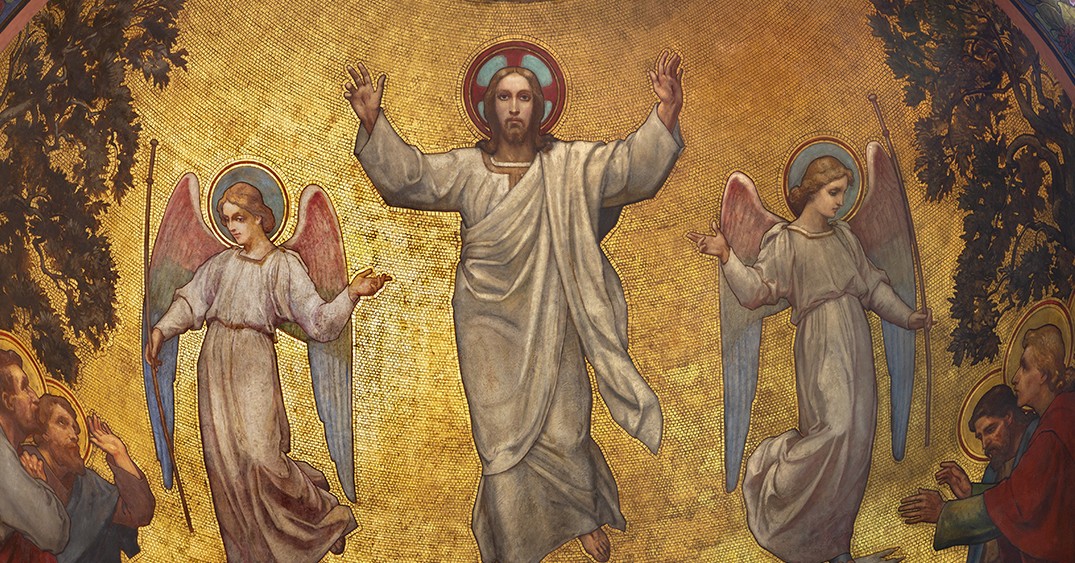
5th Sunday of Easter, 15 May 2022
We celebrate Easter for fifty days – forty days until the Ascension. We cannot conclude that when someone dies their spirit or soul will be among us for forty days – to be absent from the body is to be present with the Lord.[1] Jesus lingered for a very specific reason.
After walking with Jesus for three years, His disciples were trying to absorb His powerful words of wisdom. They had heard His words, many of which were from the Old Testament, but did not always understand. We don’t always understand what people say, and sometimes we need to read a book several times to understand it. Or imagine someone going to a restaurant and ordering the same meal three times because he cannot taste it. Sometimes we don’t understand what God is saying. We’re not called to understand everything about God, or all His dealings – He is God, and He knows what He is doing.
After His resurrection, the Lord appeared to His disciples for forty days and explained many things to them, bringing them to a point of epiphany, an “aha!” moment when they could say, “Now I understand.” On the day of His resurrection, Jesus walked with two of His disciples on the road to Emmaus and recounted to them everything the Old Testament said about the promised Messiah. Afterwards they said, “Were not our hearts burning when He spoke to us, and our eyes opened when He broke bread?”[2]
The “new” Commandment
Today’s Gospel is associated with Maundy Thursday; this name comes from the Latin, mandatum, which means commandment. Jesus spoke of His glorification on the cross, washed His disciples’ feet, instituted the Eucharist, and gave a New Commandment: “that you love one another, as I have loved you”[3].
The word “new” needs explanation. Leviticus 19:18 says,
“You shall not take vengeance or bear a grudge against any of your people, but you shall love your neighbour as yourself”.[4]
People generally don’t give others better gifts than they give themselves – sometimes we give the cheapest gifts to others and the most expensive to ourselves. This doesn’t agree with God’s commandment that the way we treat ourselves should also be the way we treat others. Yet Jesus takes this commandment to a higher level, or raises the threshold: He demonstrated His love for us by dying on the cross. We say we love one another, but it takes hard work – if we haven’t reached the point of loving one another as we love ourselves, how much more loving the way Jesus loved us. How do we love God and one another? Sometimes it even comes to the point of dying for someone else, as Jesus did for us.
How do we love?
There’s a story that a poor person, dirty and smelly, entered a church with thousands of members some time before the service began, and only very few greeted him. He walked up the aisle and sat near the front, but the ushers directed him to the back. People stared at him as if he didn’t belong, judging by his outward appearance. Later, an elder made some announcements and welcomed the church’s new pastor, and everyone clapped their hands. Then the homeless man at the back stood up and walked to the front again; everyone’s jaw dropped, and the applause stopped. The new pastor had come to the church pretending to be homeless.
He then read Matthew 25:31-46. What we do to each other we do to Christ: if we judge or say wrong things about each other, we do it to Him. Hell was not prepared for us, but for the devil and His angels. But if you want to be sure you will go to heaven, God gives us a hint: If you see someone who is hungry or poor, take care of them. The world has taught us to think only about ourselves, and we are becoming more and more individualistic: when someone comes to us with a problem, we say “I have my own problems”. The world says, “Take care of your problems and let others take care of theirs”; but God wants us to see that taking care of someone else is planting a seed, and that He will take care of us.
How will the world know you are a Christian?
The pastor said, “I see a gathering of people, but I don’t see the church of Jesus Christ”. How will the world recognize that you are a Christian? – By going to church every Sunday? By wearing a cross, perhaps a silver or gold one? By serving at the altar or preaching? By making the sign of the cross? These are good, but Jesus said it is what we do to one another that will prove we are truly His followers. We can say we are a Christian, but sometimes we hurt ourselves and God’s Kingdom by not acting like one. We need to narrow the gap between what we “know” and what we do with that knowledge, because they’re not very close to each other. How will the world know you are a Christian? Only you can answer that question; but Jesus says all men will recognize His disciples by the reality of their love for one another.
Someone who had left a church and said negative things about it later returned and was surprised to be welcomed rather than rejected. Admitting what he had done, he asked for financial help. The pastor didn’t wish to lend or give money, but he gave him a job, paid in advance. If someone has a need, may we not be too quick to say we don’t have anything, but rather ask God what He want us to do. We don’t have to give beyond our means; but we are given opportunities to be the Christian we claim to be, to act upon what we profess, and to become Christ to the world.
If the Church helps you, you owe the Church nothing. But give thanks to God; and if someone asks you for help, it is your responsibility to help them. What makes you a Christian is to love Jesus, and to love those God said we should love, even if they are unlovable. This is very challenging: How can we love others the same way Jesus loved us? The only way is to accept the God’s love, and with that love, give to others. We are not there yet, but let us take the first step.
A pastor said, “If truly the church loved each other, imagine how many people would be queuing to enter.” Let us demonstrate the true love that comes from God. The world is looking for that love, which can only be seen in you and me by what we do. It’s one thing to say we are a Christian, and another to act as one. Remember that sometimes angels look like homeless people – they’re messengers from God.
Heavenly Father, You have loved us by giving Your Son; and Your Son loved us by giving His life on the cross. May we receive and rejoice in that love. But most of the time we have difficulty sharing Your love with others. Help us, Lord, in our weakness and failures. May we truly be the body of Christ and share Your love with those around us, not only with words but with actions. As someone said, “I believe, yet help my unbelief”, we love You, but at times we fail to love You and to love our neighbours. We want You to be known, not us. Help us to act as Christians, and to love others as You have loved us. Use us as Your servants; may You be known to the world though our lives and our families; and as the body of Christ may we demonstrate who You are.
Lord, we acknowledge the gap between our beliefs and our actions, and we cry out to You to help us. May we know and understand that we find Your love by loving You, and that we find ourselves by giving our lives to You.
We thank You for those who helped others during the pandemic, and for those who are helping others during the war in Ukraine; we ask You to bless them abundantly. Thank You for reminding us that humanity can be better, and that we see the best of humanity by extending love and help to one another; may we as the body of Christ be part of this and demonstrate it.
In Jesus’ name. Amen.
Study questions
- How were the forty days after Jesus’ resurrection different from what happens to most people after their physical death? Why was it so important that Jesus appeared to His disciples during that time?
- What kind of things do you understand about God and about His ways in your life and the lives of others around you? How much do we need to understand? What do you do when you don’t understand?
- Have you had experiences where God has gradually given you understanding of something you didn’t understand before? How did this happen, and how has it changed your life?
- Do you find it difficult to share God’s love with others? Why? What can you do about it?
- Are you aware of a gap between what you understand with your mind, what is in your heart, and the way you live? What can help to make the gap less?
- How is your progress in loving your neighbour as yourself and loving others as Jesus loved you? What about your family? How is the progress of your church, and of your home cell group or the ministry group(s) you are involved in?
- Do others recognize you as a Christian? How, and why (or why not)? Why is this important, and how does it affect those around you? What steps might God be calling you to take to grow in this?
- Why must we receive God’s love in order to love others? How does this enable you to do so?
[1] II Corinthians 5:8
[2] Luke 24:13-35
[3] John 13:34, Douay Rheims
[4] NRSV









